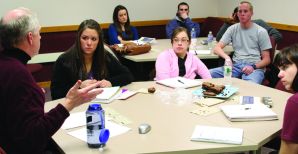Teachers weigh-in on removed requirement
Foster Care in America, People Who Make History, Sustainable Communities. These are just a few of the several Engagements with the Common Good (ECG) courses offered to current sophomores and freshmen. These classes are a part of the Justice Matters curriculum that Cabrini introduced back in 2008.

Contrary to the old curriculum, the current one has removed the previous English requirement. Although there were changes in the values, heritage, aesthetic and literacy courses, the absence of an English 101 is unquestionably contrasting to the school’s liberal arts program.
While there has not been enough time to review the reading and writing abilities of students in the old core as opposed to those in the new core, there are professors who teach various ECG classes that do not see a drastic difference in their students’ capabilities.
“Our faculty is not going to do anything that won’t benefit our students,” Amy Persichetti, English faculty and instructor of Foster Care in America, said. “I have complete confidence in it. People are committed to making our students strong writers.”
Dr. Joseph Romano, philosophy professor and instructor of Social Justice & Diversity, shares similar opinions to Persichetti relating to his current students and their skills. He emphasizes that a person’s ability to read and critically think coincides with their ability to write, regardless of their age or major.
“I never associate good writing with majors,” Romano said. “Critical thinkers are good writers. Your writing is contingent to how well you read, which is connected to critical thinking.”
Some of the current ECG teachers believe that the new curriculum has the potential to deliver more English proficiency than ever before.
“When Cabrini revised the core curriculum, we eliminated English 101 and replaced it with three writing courses: ECG 100, 200 and 300,” Dr. Michelle Filling, English faculty and On Their Own Youth in America instructor, said in an email interview.
“The reality is that writing is not like a vaccination. You can’t take a ‘dose’ of writing in the first year of college and expect to be a superb writer forever. The ECG series is designed to teach writing across the three years and potentially a fourth year if a student chooses to do a capstone project within his or her major. In essence, the ECG courses provide Cabrini students with more writing instruction than ever before,” Filling said.

Opposing views are held amongst students that are from both cores. Gabriel Kuhn, freshman undecided major, believes that an English 101 would have helped him, while Christian Nunan, junior math major, said that he prefers to write papers, which is more prevalent in the ECG courses.
Nevertheless, the future of the Justice Matters curriculum looks bright. Comparisons will have to be assessed once the first ECG participants graduate. There, more valid conclusions can be made.
“We have two functions. We deliver professional expertise through the major and the other part is the core curriculum, to have lifelong learners,” Romano said. “The ability to write is your ability to think. Writing is a manifestation of thinking.”


